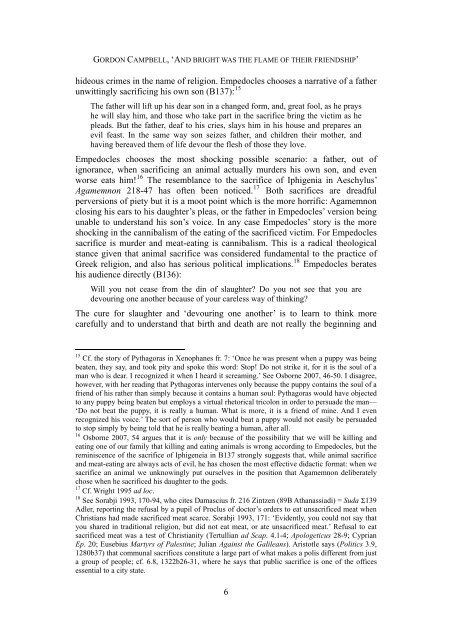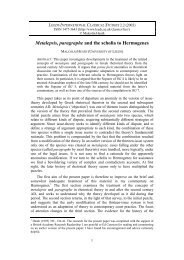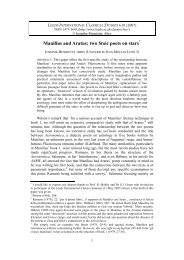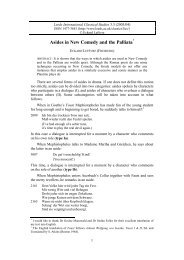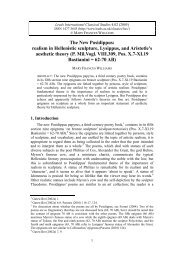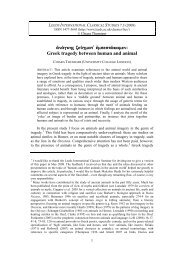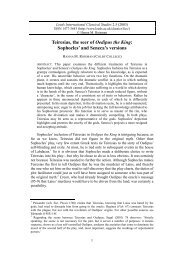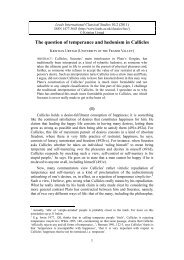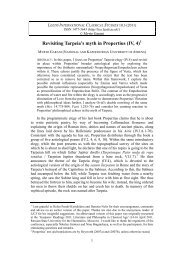'And bright was the flame of their friendship' - Leeds International ...
'And bright was the flame of their friendship' - Leeds International ...
'And bright was the flame of their friendship' - Leeds International ...
You also want an ePaper? Increase the reach of your titles
YUMPU automatically turns print PDFs into web optimized ePapers that Google loves.
GORDON CAMPBELL, ‘AND BRIGHT WAS THE FLAME OF THEIR FRIENDSHIP’<br />
hideous crimes in <strong>the</strong> name <strong>of</strong> religion. Empedocles chooses a narrative <strong>of</strong> a fa<strong>the</strong>r<br />
unwittingly sacrificing his own son (B137): 15<br />
The fa<strong>the</strong>r will lift up his dear son in a changed form, and, great fool, as he prays<br />
he will slay him, and those who take part in <strong>the</strong> sacrifice bring <strong>the</strong> victim as he<br />
pleads. But <strong>the</strong> fa<strong>the</strong>r, deaf to his cries, slays him in his house and prepares an<br />
evil feast. In <strong>the</strong> same way son seizes fa<strong>the</strong>r, and children <strong>the</strong>ir mo<strong>the</strong>r, and<br />
having bereaved <strong>the</strong>m <strong>of</strong> life devour <strong>the</strong> flesh <strong>of</strong> those <strong>the</strong>y love.<br />
Empedocles chooses <strong>the</strong> most shocking possible scenario: a fa<strong>the</strong>r, out <strong>of</strong><br />
ignorance, when sacrificing an animal actually murders his own son, and even<br />
worse eats him! 16 The resemblance to <strong>the</strong> sacrifice <strong>of</strong> Iphigenia in Aeschylus’<br />
Agamemnon 218-47 has <strong>of</strong>ten been noticed. 17 Both sacrifices are dreadful<br />
perversions <strong>of</strong> piety but it is a moot point which is <strong>the</strong> more horrific: Agamemnon<br />
closing his ears to his daughter’s pleas, or <strong>the</strong> fa<strong>the</strong>r in Empedocles’ version being<br />
unable to understand his son’s voice. In any case Empedocles’ story is <strong>the</strong> more<br />
shocking in <strong>the</strong> cannibalism <strong>of</strong> <strong>the</strong> eating <strong>of</strong> <strong>the</strong> sacrificed victim. For Empedocles<br />
sacrifice is murder and meat-eating is cannibalism. This is a radical <strong>the</strong>ological<br />
stance given that animal sacrifice <strong>was</strong> considered fundamental to <strong>the</strong> practice <strong>of</strong><br />
Greek religion, and also has serious political implications. 18 Empedocles berates<br />
his audience directly (B136):<br />
Will you not cease from <strong>the</strong> din <strong>of</strong> slaughter? Do you not see that you are<br />
devouring one ano<strong>the</strong>r because <strong>of</strong> your careless way <strong>of</strong> thinking?<br />
The cure for slaughter and ‘devouring one ano<strong>the</strong>r’ is to learn to think more<br />
carefully and to understand that birth and death are not really <strong>the</strong> beginning and<br />
15 Cf. <strong>the</strong> story <strong>of</strong> Pythagoras in Xenophanes fr. 7: ‘Once he <strong>was</strong> present when a puppy <strong>was</strong> being<br />
beaten, <strong>the</strong>y say, and took pity and spoke this word: Stop! Do not strike it, for it is <strong>the</strong> soul <strong>of</strong> a<br />
man who is dear. I recognized it when I heard it screaming.’ See Osborne 2007, 46-50. I disagree,<br />
however, with her reading that Pythagoras intervenes only because <strong>the</strong> puppy contains <strong>the</strong> soul <strong>of</strong> a<br />
friend <strong>of</strong> his ra<strong>the</strong>r than simply because it contains a human soul: Pythagoras would have objected<br />
to any puppy being beaten but employs a virtual rhetorical tricolon in order to persuade <strong>the</strong> man—<br />
‘Do not beat <strong>the</strong> puppy, it is really a human. What is more, it is a friend <strong>of</strong> mine. And I even<br />
recognized his voice.’ The sort <strong>of</strong> person who would beat a puppy would not easily be persuaded<br />
to stop simply by being told that he is really beating a human, after all.<br />
16 Osborne 2007, 54 argues that it is only because <strong>of</strong> <strong>the</strong> possibility that we will be killing and<br />
eating one <strong>of</strong> our family that killing and eating animals is wrong according to Empedocles, but <strong>the</strong><br />
reminiscence <strong>of</strong> <strong>the</strong> sacrifice <strong>of</strong> Iphigeneia in B137 strongly suggests that, while animal sacrifice<br />
and meat-eating are always acts <strong>of</strong> evil, he has chosen <strong>the</strong> most effective didactic format: when we<br />
sacrifice an animal we unknowingly put ourselves in <strong>the</strong> position that Agamemnon deliberately<br />
chose when he sacrificed his daughter to <strong>the</strong> gods.<br />
17 Cf. Wright 1995 ad loc.<br />
18 See Sorabji 1993, 170-94, who cites Damascius fr. 216 Zintzen (89B Athanassiadi) = Suda S139<br />
Adler, reporting <strong>the</strong> refusal by a pupil <strong>of</strong> Proclus <strong>of</strong> doctor’s orders to eat unsacrificed meat when<br />
Christians had made sacrificed meat scarce. Sorabji 1993, 171: ‘Evidently, you could not say that<br />
you shared in traditional religion, but did not eat meat, or ate unsacrificed meat.’ Refusal to eat<br />
sacrificed meat <strong>was</strong> a test <strong>of</strong> Christianity (Tertullian ad Scap. 4.1-4; Apologeticus 28-9; Cyprian<br />
Ep. 20; Eusebius Martyrs <strong>of</strong> Palestine; Julian Against <strong>the</strong> Galileans). Aristotle says (Politics 3.9,<br />
1280b37) that communal sacrifices constitute a large part <strong>of</strong> what makes a polis different from just<br />
a group <strong>of</strong> people; cf. 6.8, 1322b26-31, where he says that public sacrifice is one <strong>of</strong> <strong>the</strong> <strong>of</strong>fices<br />
essential to a city state.<br />
6


